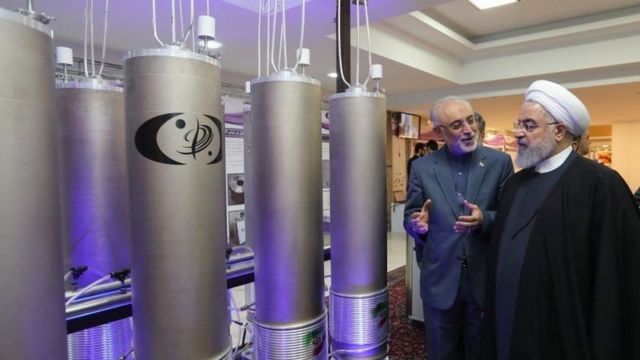
Iran’s Next Nuclear Threat
The global landscape, politically, militarily and economically, seems to have entered a new turn after the Russians launched their war of aggression against the Ukrainian state, this war has put the world at a crossroads, as totalitarian and authoritarian regimes such as the Iranian, Chinese, Assad regime and others have gone to line up behind Russia in its war of aggression, while European democracies with democracy in the United States have stood behind Ukraine in its defense.
The international alignment hides behind it a conflict that has not yet reached the level of direct attacks, and this conflict bears the characteristic of a conflict between two axes, the first: Russian-Chinese-Iranian dictatorship, and the second axis: a European-Western-American democratic axis. This encounter reveals a global crisis between two contradictory economic and political systems, the first drags humanity into the square of the permanence of tyranny, the systems of oppression, and the square of the one totalitarian mind, while the second western system Democracy, it drags humanity towards an open horizon for the development of the human mind, free economic development, the sovereignty of human rights and the transparent circulation of power through democratic elections.
Russia’s war on Ukraine has allowed Iran to take advantage of this war, to break the embargo and the sanctions regime applied to it, and thus the mullahs’ regime in Tehran has rushed to support it, weakening the U.S. and Western position in countering Russian aggression, which could deepen the war toward other European states opposed to this war, which could ignite a third world war at any moment.
U.S. policy under Biden is still without real claws facing Iran’s nuclear program, a program that no one in the world in general and in the West in particular would have objected to, if it had not hidden a military nuclear program aimed at making the Iranian atomic bomb.
Simply put, it can be said that Iran, through its imperial project (the revival of the Persian Empire), cannot assert its hegemony once and for all, without the presence of an overwhelming military threat tool to neighboring countries or to the world, a threat that Tehran’s king believes will not be available without Iran’s possession of a destructive nuclear weapon.
Therefore, according to these concrete material data, which occurred after the Russians launched their war on the Ukrainians, specifically the difficulties Iranian face in the Syrian arena, as well as the difficulties that the Russians face in Syria, the Americans are concerned with reproducing their policy toward the Middle East, specifically in relation to the conflict in Syria and on it, and the restoration of American strategic relations with its historical allies in this region, the first of which is the Gulf Arab states.
The U.S. promises made from time to time by joe biden’s administration toward its Saudi, Gulf or Arab allies are no longer valuable. The security of these allies should not be based on promises or the signing of trade, economic and other agreements, but must be reproduced in principle to preserve the security of these countries from the Iranian threat, to have a club in political relations, and a genuine respect for the privacy of each allied country for its internal circumstances in a manner that does not conflict with the iranian threat. General principles of human rights without accusations or blackmail.
Joe Biden’s trip to the Middle East, specifically to Saudi Arabia, could not make a real breach of saudi arabia’s position of refusing to pump oil and gas at U.S. will, which is because of Joe Biden’s campaign punishing to Saudi Arabia. Until recently, this policy was going like this, which gives the reasons for Saudis to not trust a pragmatic change in biden administration policy.
If the White House, which awaits midterm elections to both houses of Congress, is concerned with achieving results in favor of countering Russia’s war on Ukraine and preventing Chinese penetration in the Middle East, it should reconsider the issues of this region in a way that serves its people and pushes their governments to stand unhesitatingly with U.S. policy that will not fail them or ignore their vital interests in the region.
The Americans should press to stop the war in Yemen by pressuring the Houthis to accept a political solution without hijacking the rule by force of arms, this kidnapping is supported by Iran.
Biden must not forget the two-state solution in the Arab-Israeli conflict, which provides the region with strategic stability, but the withdrawal of regimes for reconciliation with the State of Israel may temporarily serve stability, but it keeps the deep contradiction between the Arab peoples and Israel in place and transformable in other circumstances of bloody conflicts that the region does not need.
Focusing on the threat of Iran’s nuclear program must be at the center of current and upcoming U.S. policy in the Middle East and trying to lure Iranians with gains will not solve this threat and its reflection on the vital interests of the United States of America and the democratic West as a whole.
The United States is required to reproduce the U.S. vision and policy from Iran, deterring it strongly and clearly by rejecting its nuclear program in its military apartment, and this is reinforced by restoring stable, strategic, and trusted relations with allies in this important region of the world. The United States should take Russia-China rapprochement with Iran seriously. President Biden’S administration should give up the good faith of its enemies and bury the nuclear deal with Iran forever. The fact that countries in the region will be under Iranian nuclear threat will create multiple existential and international threats that threaten global security and peace that Europe and America will not survive.
It is time for the United States to identify and neutralize its enemies. The United States should stop its policy of political relativism, vagueness, and grayness, and bury the dreams of the Iranian nuclear agreements forever. All indicators and variables demonstrate beyond any doubt that the Iranian threat represented as a base and an advanced front and as a strategic ally to the rival Sino-Russian axis, which has nuclear capabilities and is militarily advanced, is ripening and inevitably coming soon. Either the United States strikes this imminent threat now or it can never strike.
Does the Biden administration go this way, or will it continue to bet on Tehran’s walis to be convinced of the need for peace and security and are the ones who are making the wars of aggression in the Middle East?
